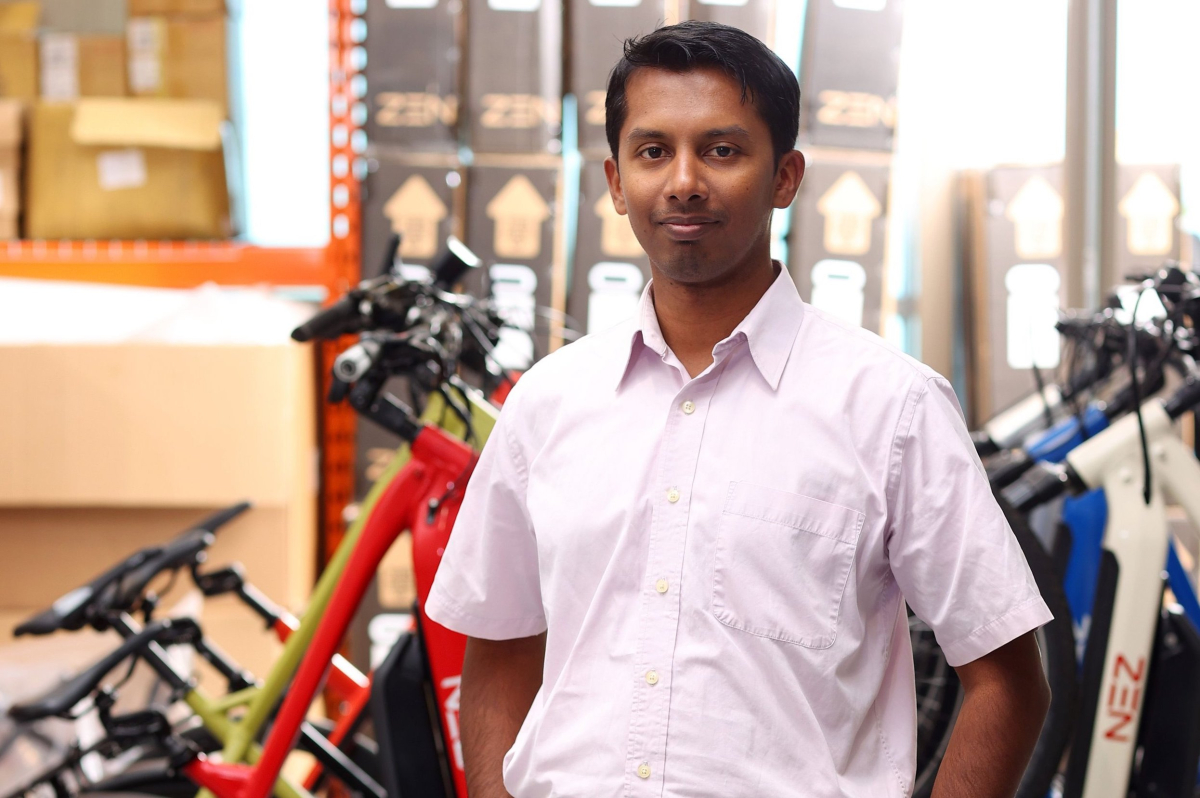Support strong Canadian climate journalism for 2025
Ravi Kempaiah apologetically pops into the interview a couple of minutes late: “Running a startup is like having accidental triplets. At any point in time, there are three things going on — and something’s about to break.”
Heading an e-bike and energy storage startup — and potentially helping to revolutionize the world of transportation — was not on Kempaiah’s mind back in 2013, when he bought an e-bike. He was just a grad student looking for an easy way to get around.
“It really changed my commute from university to off-campus housing, and I kept thinking, why are more people not using this? They're taking an SUV just to travel three, four miles,” Kempaiah recalls. “I kept thinking, how could we popularize this?”
His short-term solution? Raise awareness by setting a new Guinness world record for longest e-bike journey: 8,200 km from Madison, WI to San Diego, CA. Total cost of electricity along the way? Six dollars.
The longer-term solution? Well, that’s what brought Kempaiah to Halifax’s Dalhousie University, and, more specifically, to Jeff Dahn’s world-renowned battery lab, which describes itself as working to “improve the energy density, increase the safety, decrease the cost, and improve the cycle and calendar lifetime” of lithium-ion batteries.
Kempaiah is a post-doctoral fellow at the lab, and the founder and CEO of Dartmouth, NS-based Zen Energy, which grew out of his Zen E-bikes startup. He hopes the company’s battery technology will help lead to greater adoption of e-bikes worldwide.
One of the “pain points” holding back e-bikes is uncertainty related to safety and reliability, especially in hot climates, he says.
“Batteries don't like high temperatures. That's one of the reasons if you keep your phone in the back of a car on a summer day, if it overheats, it shuts down to protect itself,” Kempaiah says.
Unlike electric car batteries, which are liquid-cooled, batteries on the two- and three-wheeled vehicles common in large parts of Africa and India rely on air cooling — which is less effective in the heat.
But Kempaiah said Zen’s batteries help solve that problem.
“With the chemistry developed here, working with our key partners Novonix and Dalhousie, even at 40 degrees Celsius, your battery will still easily last eight years,” he says. “It will withstand more than anything on the market right now. And what that does is eliminate the pain point and skepticism around the batteries.”
According to Kempaiah, there is huge potential for lowering emissions by converting riders in the Global South from gas-powered to electric-powered bikes, and the conversion will save them money in the process.
“In India, Indonesia, and Nigeria, they all use two-wheelers and they're 98 per cent petrol-based right now,” he says. “It’s not sustainable, but they don't have an alternative.”
Kempaiah may have started out in the e-bike business, but he soon realized that reliable batteries can have many other applications. That’s why he founded Zen Energy, and is now working on bringing the company’s battery technology to other vehicles.
“There'll be another division, probably in the next six months, that will focus on a light electric vehicle pack, and then next year we'll have a division for a high-voltage pack for electric boats and buses,” Kempaiah said. “But we started with the bike division because that’s something we know very well. We can make an impact there, and once we have shown the growth potential, we can scale that to light electric vehicles.”
Zen e-bikes has shipped $2 million worth of bikes since May 2022, Kempaiah says, and the company is a partner in a “mega factory” slated to open in India the first week of August 2024, which will be able to manufacture “about 5,000 battery packs a month.”
But the company’s business isn’t entirely focused overseas. In early August, Zen also launched the Keji Cruiser, a limited-edition e-bike being sold in Nova Scotia at a discounted rate.
“The goal is for us to bring this tech to a wider market, get people excited and see how good Nova Scotian companies can be,” Kempaiah said.
The next step is to solve a current pain point: getting more protected bike lanes, so riders feel safe on the roads. Nova Scotia’s provincial rebate program has helped residents of the province purchase nearly 7,500 e-bikes, but there’s still more work to be done.
“It’s so wildly popular. The only thing preventing people is infrastructure. Lack of protected bike lanes,” Kempaiah says. “That’s the number one barrier here. Next comes the weather. But if you had good protected bike lanes, most people would bike from May until November. That’s seven months of the year.”
The Climate Story Network is an initiative of Climate Focus, a non-profit organization dedicated to covering stories about community-driven climate solutions.





Comments
Couple of issues. At present there are NO federal standards for eBike batteries. I checked with the relevant federal department (Weights and Measures) and it said maybe there will standards in 2025. Knockoff batteries don't have the Underwriters Laboratories of Canada label and these cheap and dangerous batteries are still on the shelves of big box stores.
Both these things have to be addressed before wider acceptance of Bikes in apartment buildings, otherwise the number of landlords banning all small eVehicles will only continue to grow.